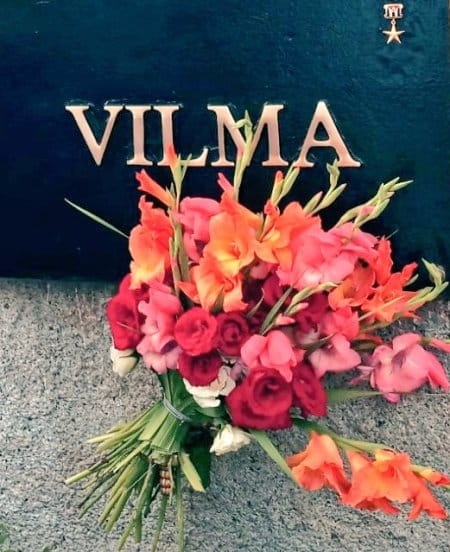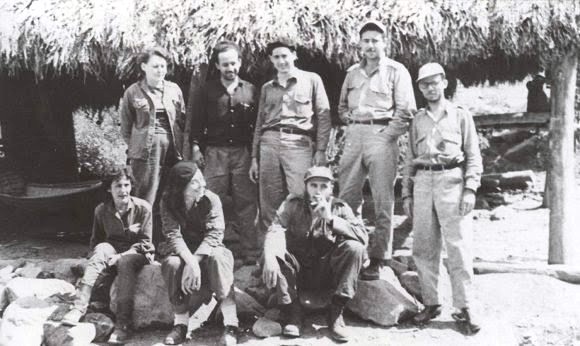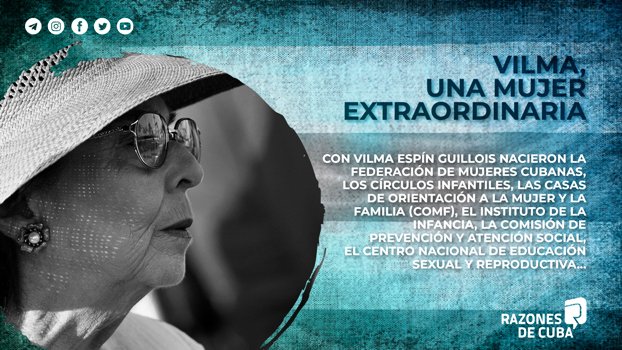
Vilma Espín: the validity and symbolism of her example
Died in Havana on June 18, 2007, Vilma Espín Guillois is a symbol of the integrity, tenderness and dedication of Cuban women to the cause of the Revolution.
She was an outstanding fighter against the Batista dictatorship and later a great leader of the Revolution.
Vilma Ella was born in Santiago de Cuba on April 7, 1930. In 1948 she entered the recently created Universidad de Oriente as a student and participated in the struggles for its officialization.
She was one of the first women to graduate in Cuba as an Industrial Chemical Engineer.
When the coup d'état of March 10, 1952 took place, in his hometown and in the province of Oriente in general, he began to participate in the preparation and launching of pamphlets, as well as in rallies, street demonstrations and other activities that called for confrontation and the rejection of the Batista dictatorship.
She later got involved with Frank País and was part of the July 26 Movement. She participated in the preparations and in the uprising of November 30, 1956 in Santiago de Cuba.
In February 1957, she attended the meeting called by Fidel Castro in the Sierra Maestra to coordinate everything related to the development of the revolutionary struggle.
She was then designated a member of the National Directorate of the July 26 Movement.
She also later assumed the function of Provincial Coordinator in the East of said organization, a task she carried out until July 1958, when it was decided, in order to prevent her from being captured by the agents of the dictatorial regime, to move to where the members of the Second Eastern Front were. "Frank País", directed by Commander Raúl Castro.
Starting in January 1959, after the triumph of the Revolution, she first directed the Radio Rebelde station. She later she also developed an active work to achieve the integration of women's associations that existed in the country in a single organization.
This became a reality on August 23, 1960 in Havana when the Federation of Cuban Women was created.
Precisely when speaking on that occasion, the maximum leader of the Cuban Revolution, Commander in Chief Fidel Castro, highlighted ´the importance of the work that this organization and women in general could carry out in relation to the development and defense of the revolutionary process in the country.
Fidel specified:
“The Revolution has, without a doubt, a very large support in the female sector of our population. For this reason, from the first moments a series of activities were observed with the active participation of Cuban women. It was nothing new for our country. Our country can be proud of many things, but among them, the first of all, for the magnificent people it has. Here not only men fight. Here, like men, women fight.”
Vilma Espín was elected President of the Federation of Cuban Women on August 23, 1960, and since then she has continued to fight to promote full equality for women and their incorporation into work and the dissimilar tasks that contributed to the development and defense of the Revolution.
She led that organization for several decades. She was ratified to continue carrying out that responsibility in the congresses held in successive years.
Vilma Espín first joined the Central Committee of the Communist Party of Cuba, established in 1965, and later was a member of its Political Bureau.
She was also elected Deputy to the National Assembly of People's Power of the Republic of Cuba, since its first legislature in 1976 and member of the Council of State.
Representing Cuba, Vilma Espín participated in several international events in which the situation of women in the world was analyzed.
She dealt with the experience of Cuba and how the participation of women in a direct way in the development of society was evident, the guarantee of their essential rights, such as their incorporation to work in equal conditions, their improvement and also how they held positions leadership both in the Party and in the Government, as well as in the leadership of mass and social organizations.
She condemned in those international assemblies and/or congresses how women in different parts of the world continued to suffer cruel exploitation and discrimination.
Vilma Espín was not only a popular Cuban leader, but she also enjoyed prestige in various parts of the world for her work and for the importance of the principles she exposed.

He received multiple decorations, titles and national and international orders, among which the honorary title of Hero of the Republic of Cuba and the Lenin Prize for Peace stand out, but above all the greatest award was that of having the affection and respect of the people and in a very special way of Cuban women.
After his death in 2007 in Havana, his remains were transferred and deposited in the Frank País Second Eastern Front Mausoleum.
On the fifteenth anniversary of her death, Vilma continues to be a source of motivation and teaching both for the Cuban people and for many men and women in different parts of the world.
Precisely about the transcendence and validity that Vilma Espín's life and work had, has and will have, Fidel wrote a Reflection on June 20, 2007, entitled "Vilma's struggles", in that memorable writing he stated:
“Vilma's example is today more necessary than ever. She devoted her entire life to fighting for women when in Cuba most of them were discriminated against as human beings just like in the rest of the world, with honorable revolutionary exceptions.”